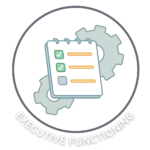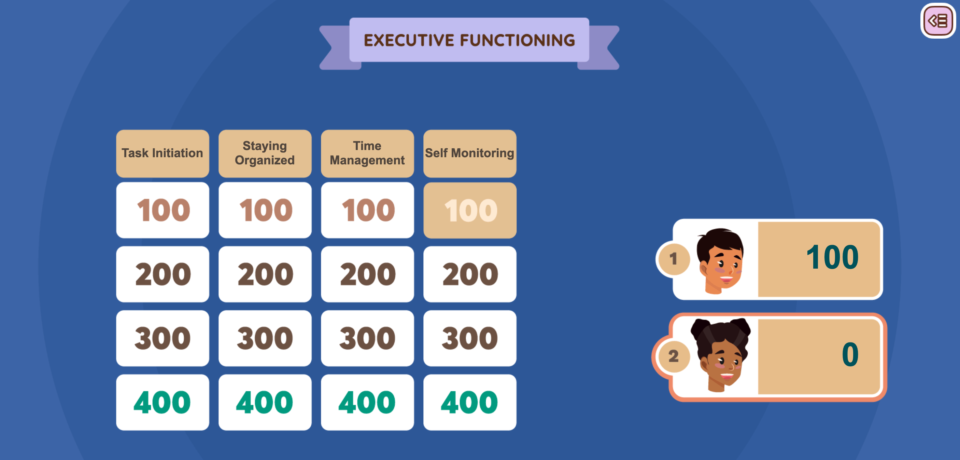
Looking for materials or ideas to teach elementary executive functioning strategies? Of all the essential skills we teach, executive functioning stands out as a cornerstone for student achievement. This blog post delves into effective and straightforward strategies aimed at enhancing executive functioning in elementary students. With a focus on ease and accessibility, the included lesson plan requires minimal preparation, ensuring that educators can seamlessly integrate these activities into their daily routines.
Understanding Executive Functioning
Before we dive into the lesson plan, it’s crucial to understand what executive functioning entails. Executive functioning skills are the mental processes that enable individuals to plan, focus attention, remember instructions, and juggle multiple tasks successfully. These skills are fundamental for learning, behavior, and development. For elementary students, developing strong executive functioning skills can significantly impact their academic performance, social interactions, and ability to handle emotions and tasks.
Lesson Plan: Elementary Executive Functioning Strategies
This lesson plan is designed to be flexible, allowing educators to adapt it to fit the needs of their students and the constraints of their schedules. The activities are intended to be engaging, interactive, and, most importantly, fun for the students. Each activity targets specific aspects of executive functioning, such as working memory, flexible thinking, and self-control.
Activity 1: The Tower of Power
Objective: Improve planning and problem-solving skills.
Materials: Blocks or any stackable items.
Instructions:
- Divide the students into small groups and give each group a set of blocks.
- Challenge them to build the tallest tower they can, but with a twist: they must plan their tower on paper before starting to build.
- Discuss the strategies they used and the challenges they faced.
Activity 2: Simon Says, “Focus!”
Objective: Enhance attention and working memory.
Materials: None.
Instructions:
- Play a game of “Simon Says” with a focus on complex sequences to challenge the students’ ability to pay attention and remember instructions.
- Gradually increase the complexity of the commands as the game progresses.
- Reflect on the experience, discussing moments of difficulty and strategies to maintain focus.
- BONUS – we offer a digital game called “Selby Says”, if you search our Social-Emotional Learning platform, you’ll find it!
Activity 3: The Emotion Thermometer
Objective: Develop emotional control and self-monitoring.
Materials: Paper, crayons/markers.
Instructions:
- Each student creates their “Emotion Thermometer” with colors indicating different feelings (e.g., calm, happy, frustrated).
- Discuss scenarios and ask students to mark how they would feel in those situations, using their thermometers.
- Share strategies for cooling down when emotions run high.
Activity 4: The Flexibility Ship
Objective: Foster flexible thinking.
Materials: A variety of common classroom items.
Instructions:
- Present a common item and ask students to come up with as many different uses for it as they can, beyond its intended purpose.
- Encourage creativity and acknowledge all ideas to foster an open and imaginative learning environment.
- Discuss the importance of being able to think about problems and tasks in new ways.
Activity 5: Play Everyday Speech Social Trivia
Objective: Improve time management, organization, self-monitoring, and task initiation
Materials: Everyday Speech online platform
Instructions:
- Split students into teams or select from either 1-4 players.
- Students will select trivia questions from these 4 categories; time management, organization, self-monitoring, and task initiation
- Complete full or mini game (with the ability to save and play over multiple sessions!)

Unlock your free material for this lesson by signing up for your free trial today – no credit card required!
Get your free materials here!
Instant access to thousands of no-prep social skills activities, over 800+ video lessons, and engaging games designed to enhance learning and development.
Conclusion
By incorporating these simple, no-prep activities into your teaching routine, you can significantly impact your students’ development of crucial executive functioning skills. These strategies are not only beneficial for academic success but also for fostering resilience, flexibility, and self-control in everyday life. Remember, the key to successful education lies not only in the knowledge we impart but in the life skills we nurture along the way.
Sample Video
Students learn best from watching real students their own age model skills. Try out this sample video lesson. We offer our entire Social-Emotional Learning platform free for 14 days here!
Related Blog Posts:
Teaching Problem-Solving Skills through Social-Emotional Learning
Teaching Planning to Elementary Students: Strategies and Activities
Engaging PK-12 Digital Social-Emotional Learning Curriculum





